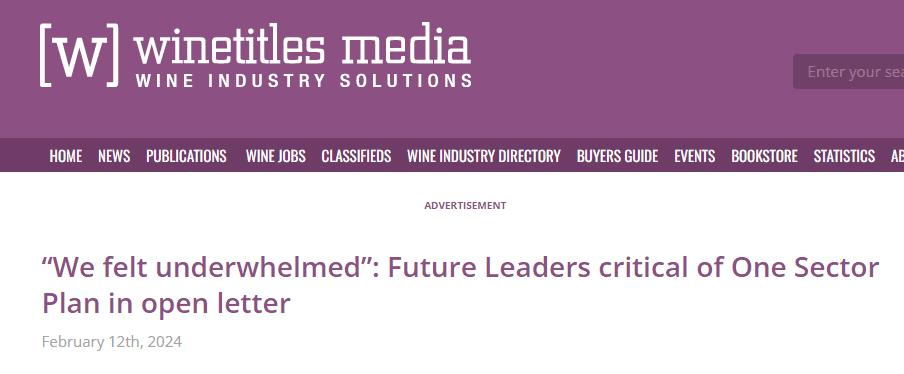I have published my comments on the total failure of the wine industry’s One Grape & Wine Sector Plan to offer anything either meaningful or relevant to its current plight. Truth be told, its inadequacy was no real surprise. What has come as a surprise was the response to this plan published by the current crop of 15 Future Leaders comprising the industry’s elite mentoring and training program.
I’m truly shocked at its disconnection, sense of entitlement and utter tone deafness.
Just when you thought you had heard enough tone deafness from those charged to steer Australian wine into safer waters, it just got worse. If you think the current mob in charge of setting industry focus, direction and expenditure are either incapable or unwilling to change the status quo of Australian wine, it’s now obvious that the next generation of Future Leaders coming through the ranks are even more disconnected.
In a document titled ‘An Open Letter and Formal Feedback to Wine Australian and Australian Grape & Wine regarding the One Grape & Wine Sector Plan, Draft, 2024’ (full text here), this group of 15 chosen beacons of hope and inspiration for Australian wine have published a pompous, poorly written and constructed series of ineffectual, peripheral and politically aspirational observations that spectacularly avoid any meaningful connection with the realities facing Australian wine.
The authors of this document are Amy Blackburn, Steven Paul, Andrew Shedden, Belinda van Eyssen, Bodhi Edwards, Caitlin Davies, Eloise Jarvis, George Taylor, Jamie Pike, Katie Spain, Kendall Clements-Virag, Lucy Etheridge, Monica Gray, Ray Ruiming Chen and Andrew Duff. You can learn a little about them here.
I began reading their document with a sense of optimism. It kicked into gear with ‘…the OSP (One Sector Plan) did not offer specific actions or pathways (to address these changed circumstances, my brackets), nor which stakeholders were accountable, nor measurable targets to achieve. Instead, broad statements, in many cases reinforcing no change of action, ‘continue’, were offered. We understand it is important to maintain high level thinking to allow innovative, creative and practical ideas to flourish but we felt underwhelmed.’
Over the target, I thought! But, like trying to bomb a target obscured by cloud, they missed not only the bullseye but quite possibly the entire dartboard.
Sadly, while posing themselves that ‘leaders must act’ and by pointing out the abovementioned inadequacies of the OSP, the Future Leaders chose not to follow their own advice. Instead, they have done exactly what they accuse their sponsors at Wine Australia and Australian Grape & Wine of doing.
A couple of paragraphs into their document, the Future Leaders offer this comment: ‘Both Will Diversity, Equity & Inclusion become the New Greenwashing and Embracing the New Norm of Equity & Equality in the Wine Sector highlight the need for cultural change within our industry now – if we are to be a sector of choice.’ If anyone can translate that into English, please send it to me. For, having read it now close to thirty times, that sentence might as well be written in hieroglyphics or Urdu.
However, their intentions do become more clear. As their first strategy listed to save Australian wine, our Future Leaders believe our current industry leaders should encourage a more diverse group to consider entering wine production as a career. Well and good; our industry should be open to everyone. No argument. Secondly, Australian wine producers should engage more with First Nations people because they will enhance the sense of pride in our land stewardship and help growers and producers reach sustainability goals.
Having personally met dozens of farmers whose work has restored eroded and infertile land to environmental balance and enhanced productivity with reduced chemical input (my degree was in agricultural science), I don’t understand how anyone could be more proud of their work for and on behalf of their land than such people, whose stewardship has been exemplary. I see the same thing all the time when I visit vineyards.
With no disrespect whatsoever to our First Nations population or any other racial group within Australia, I believe that what is needed to achieve sustainability goals in modern viticulture and wine production is entirely unrelated to race and has everything to do with the steadily evolving science behind viticulture, winery waste management and environmental management. Are the Future Leaders suggesting the industry implements the kind of consultative process that was adopted by and then quickly removed by the WA Government? They need to provide the sort of clarity that they (correctly) say the OPS is light on.
Australia’s plethora of wine regions – officially called Geographical Indications (you can see them all here) – is already baffling enough to those of us who try to comprehend them for a living. Apologies to anyone who might grown grapes there, but how a name for a region called New England Australia ever got up is beyond my comprehension and always gets me a laugh overseas. Following the lead established by those like Alan Joyce, our Future Leaders wish to simplify the issue by including ‘First Nations’ geographical indications’ within the wine regions’ actual names. Silly me. I thought we were trying to make wine less complicated.
Furthermore, the wine industry apparently needs its own Acknowledgement of Country to ‘be a meaningful and symbolic gesture to all Australians, particularly to those who have lived here for millennia’.
The area planted to winegrapes in Australia is way too large, with the inevitable outcomes that growers of fruit are being underpaid, are leaving the industry and are experiencing mental health issues. According to our Future Leaders, it’s the lack of engagement with and transparency from broke, nearly broke or wine producers for sale that’s causing the anxiety and causing growers to reconsider their future in the industry or leave.
Without trivialising this in any way, this approach is typical of the modern means by which problems are addressed – deal with the symptom and not the disease. In this regard, our Future Leaders are well and truly up with the times. Why not instead consider serious means by which to resolve the over-supply and to assist those who simply have no choice but to leave?
Dealing with the over-supply with what they describe as ‘thinking outside the bottle’, our Future Leaders focus exclusively on Generation Z, which in their MBA-speak is apparently now known as Mil Z. We need to align with their values, they write, and create for them ‘new products and gateway beverages for all occasions’ by ‘creatively using grapes to help alleviate the oversupply’. We should ‘give them what they want’ and use ‘exceptional design thinking’ and ‘boldly make it recognisable as coming from us’.
Without any further explanation or justification, this appears to be a call to action for roughly half of the wine industry to stop making wine as we know it, to invest in the development of new beverage concepts, to identify Mil Z markets and create new strategies for them, to create radical new packaging concepts and then to sell these new products (whatever they may be) at a profit. If I drove up to Berri, Mildura or Griffith right now trying to sell that solution to a family of traditional grape growers, I’d swiftly be shown the open end of a shotgun. And rightly so.
It takes either rare genius, incredible fortune or else years of expensive product development to implement what the Future Leaders offer as their immediate solution to Australia’s oversupply of winegrapes. Am I alone in feeling a total disconnect between what they are saying and what those at the dark, hard end of the coalface are experiencing right now?
Devoting plenty of space to the importance of discovering more Future Leaders - who apparently need mentoring ‘before even they know they are one’ – the document then focuses on the development of action plans, data, internal consultation within the industry, plus annual reviews of the above. All of which we have heard multiple times before and none of which will provide any relief for a struggling wine brand which needs solutions and strategies now. Or will the bank managers and receivers hear this and then extend credit and terms?
Personally, the response by the Future Leaders has left me stunned. I’ve been so shocked at its tone-deaf, self-indulgent and entitled nature that I’ve had to calm myself down for a week before being able to write about it as dispassionately as I can. It spectacularly avoids any of the real glaring omissions of the OSP and instead simply reinforces my fear that the industry could slide beneath the waves while its band of leadership groups – current and future – are playing out of step tunes that nobody wants to hear.
It offers no mention whatsoever of key foundation issues such as how Australia might make better and more affordable wine, how it might seek to engage better with key markets, or how Australia can dilute or remove its retail duopoly. To give them some credit, the Future Leaders do call for a review on alcohol taxation, seeking to ‘lead the way with evidence-based arguments for reform that benefits our wider community’. Even here I still get the feeling they’re missing the point – that the main reasons for tax reform should be to provide rationality and fairness for those engaged in producing and selling wine. The current system totally distorts the business model behind the industry, which I’ve covered in more detail here.
To all but conclude, our Future Leaders end with the complete lack of humility and the hubris to which a reader will have become fully accustomed by this stage: ‘Throw 15 strangers together, taking them through a well curated leadership program that exposes their vulnerabilities and provides skills to overcome them creating connections that will last a lifetime, and what do you get – Thought Leadership Volumes 1, 2, 3 and 4.’
I can hear the collective sighs of relief from growers and makers up and down the sweeping plains of our sunburned land.
This document was a missed opportunity and a telling one. All it does is promise an even more disconnected version in future of what is happening now. If it was less of a concern to me, I wouldn’t have bothered writing about it. But I am genuinely troubled.
It simply reinforces my belief that nobody – now or in the future – is coming to save any producer, from any region. It’s all up to the individual businesses. The more they depend on the industry’s ability to save them or give them succour, the more painful their demise will be.













